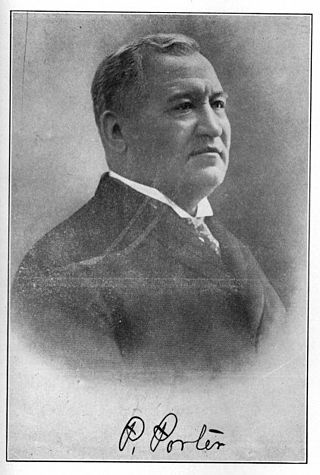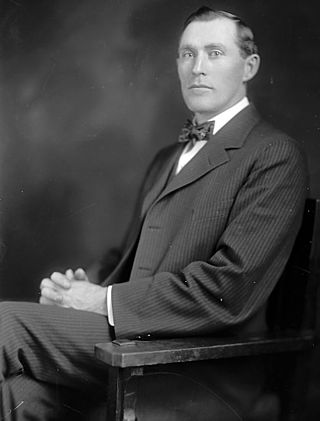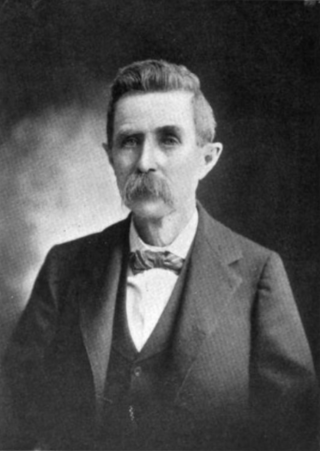Related Research Articles

Duplin County is a county located in the U.S. state of North Carolina. As of the 2020 census, the population was 48,715. Its county seat is Kenansville.

Vinita is a city and county seat of Craig County, Oklahoma, United States. As of the 2020 census, the population was 5,193.

Wade Hampton III was an American military officer who joined the Confederate States of America in rebellion against the United States of America during the American Civil War. He later had a career as a South Carolina politician. Hampton came from a wealthy planter family. Shortly before the war, he was both one of the largest enslavers in the Southeastern United States and a state legislator. During the American Civil War, he joined the Confederate cavalry, where he was a lieutenant general.

The Territory of Oklahoma was an organized incorporated territory of the United States that existed from May 2, 1890, until November 16, 1907, when it was joined with the Indian Territory under a new constitution and admitted to the Union as the state of Oklahoma.

William Henry Davis "Alfalfa Bill" Murray was an American educator, lawyer, and politician who became active in Oklahoma before statehood as legal adviser to Governor Douglas H. Johnston of the Chickasaw Nation. Although not American Indian, he was appointed by Johnston as the Chickasaw delegate to the 1905 Convention for the proposed State of Sequoyah. Later he was elected as a delegate to the 1906 constitutional convention for the proposed state of Oklahoma; it was admitted in 1907.

Pleasant Porter, was an American Indian statesman and the last elected Principal Chief of the Creek Nation, serving from 1899 until his death.

William Henry Vanderbilt III was an American politician who served as Governor of Rhode Island from 1939 to 1941, and a member of the wealthy and socially prominent Vanderbilt family.

The Constitution of the State of Oklahoma is the governing document of the U.S. State of Oklahoma. Adopted in 1907, Oklahoma ratified the United States Constitution on November 16, 1907, as the 46th U.S. state. At its ratification, the Oklahoma Constitution was the lengthiest governing document of any government in the U.S. All U.S. state constitutions are subject to federal judicial review; any provision can be nullified if it conflicts with the U.S. Constitution.

The 1876 South Carolina gubernatorial election was held on November 7, 1876, to select the governor of the state of South Carolina. The election campaign was a referendum on the Radical Republican-led state government and their Reconstruction policies. Opponents disputed the challenger Wade Hampton III's victory, gained by a margin of little more than 1100 votes statewide. But he took office in April 1877, after President Hayes withdrew federal troops as a result of a national Democratic compromise, and the incumbent Daniel Henry Chamberlain left the state.

Thomas Alberter Chandler was an American politician and a U.S. Representative from Oklahoma.

Clement Vann Rogers was an American politician and judge in Indian Territory. Clem Rogers' parents were both mixed-blood Cherokees who moved to Indian Territory in 1832, several years before the Trail of Tears. Before the American Civil War, Clem allied with the "Treaty Party", a Cherokee faction that supported signing the Treaty of New Echota. When the Civil War broke out, Clem enlisted in the Confederate Army, and served under General Stand Watie. After the war, he became active in Cherokee politics, first elected as a judge in the Cooweescoowee District, then served five terms in the Cherokee Senate. He later served as a delegate to the Oklahoma Constitutional Convention. Rogers was the father of entertainer Will Rogers.
The Sequoyah Constitutional Convention was an American Indian-led attempt to secure statehood for Indian Territory as an Indian-controlled jurisdiction, separate from the Oklahoma Territory. The proposed state was to be called the State of Sequoyah.
Albert C. Hunt (1888–1956) was an American lawyer and judge. He was the only person to serve on the Oklahoma Supreme Court from two different districts.
J. Howard Langley was a justice of the Oklahoma Supreme Court for less than one month from January, 1931 until February 2, 1931. His term was truncated by health problems that he blamed on the rigors of campaigning for the office. Born and educated in Missouri, Langley moved to Indian Territory in 1891, where he entered the mercantile business. He became licensed to practice law in 1897, and moved to the town of Pryor to begin private practice. He was elected a delegate to the Oklahoma Constitutional Convention in 1905, where he gained much public exposure. After statehood, he returned to his private practice in Pryor, until he entered the race for a Supreme Court seat in 1930. Although he won the election, he served less than a month before resigning on account of ill health. After recovering, at least partially, he was named to the board of directors for the Grand River dam project and was elected chairman. He did not live to see the project completed, dying in 1935.
James R. Keaton was a justice of the Territorial Oklahoma Supreme Court from 1896 to 1898.
Joseph A. Gill was an American federal judge.
Kornegay is a surname. Notable people by that name include:
John H. Pitchford (1857-1923) was an American jurist from Walhalla, South Carolina, descended from Irish immigrant ancestors. Pitchdford was raised in Walhalla and completed his early education at Newberry College. He then studied law in a private law office, and was admitted to the bar on his 21st birthday. His first legal practice was in Clayton, Georgia, but he soon moved to the city of Gainesville, Georgia.
Samuel W. Hayes (1875–1941) was born in Arkansas, and moved to Texas with his parents when he was a small child. He completed his basic education in Texas, then attended the University of Virginia. He apparently did not graduate, but his college experience sufficed to qualify him as a school teacher. He spent the next three years teaching in the community of Ryan in the Chickasaw Nation, then part of the Indian Territory. He also began studying law in a local law office and was admitted to the Territorial Bar in 1899.
Thomas Horner Owen (1873–1938) was a judge of the Oklahoma Supreme Court. Born and raised in Arkansas, he moved to Indian Territory in 1894. According to Victor Harlow's version of Owen's biography, Owen was born near Jasper, Arkansas on February 24, 1873.
References
- 1 2 3 4 5 6 7 8 9 Martin, Benjamin. "Judge Wade Hampton Kornegay (1865 - 1935)". In: "Necrology", Chronicles of Oklahoma. Volume 18, No. 1, March, 1940. Accessed December 10, 2016.
- 1 2 "A Native North Carolinian Who Played an Important Part in the History and Development of the State of Oklahoma." Duplin Times. August 11, 1944. Accessed April 2, 2020.
- ↑ "Oklahoma Hall of Fame Inductees." Accessed December 13, 2016.